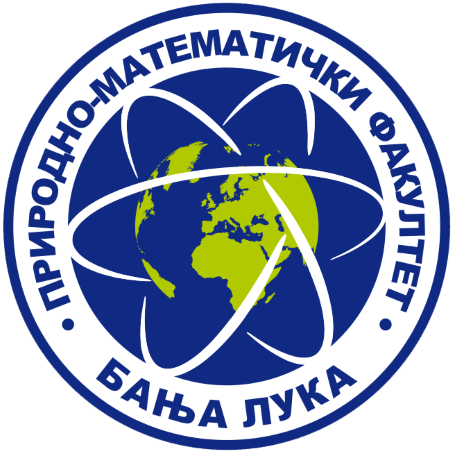Faculty Members
Faculty Members
 Faculty members represent the foundation of our academic excellence.
Faculty members represent the foundation of our academic excellence.
Our faculty team consists of professors with extensive experience in teaching and research, as well as young researchers and experts from various fields of natural, mathematical, and computer sciences. Their dedication to students is reflected in an innovative approach to teaching, mentoring, and guiding research.
Faculty members at the Faculty of Natural Sciences and Mathematics are not just lecturers; they are mentors, guides through the world of science, ready to encourage critical thinking and a spirit of inquiry in their students. Collaborators at the Faculty actively contribute to scientific research, striving to meet high standards in their respective fields. More about the academic staff at the Faculty of Natural Sciences and Mathematics can be found here.
This community of lecturers, assistants, and laboratory staff forms the core of the Faculty of Natural Sciences and Mathematics, creating an inspiring environment that fosters research and development. Their commitment to their work makes the Faculty not only a place of learning but also a source of continuous inspiration for future generations of scientists and professionals. More about collaborators and laboratory staff can be found here.

 Our academic community is organized through study programs. The Study Program Council consists of teachers and collaborators employed in that study program. The Study Program Council is responsible for shaping the curriculum, proposing decisions on the engagement of teachers and collaborators, and providing guidelines for quality academic practice. Through collaboration and dialogue, council members contribute to the continuous improvement and adaptation of the program to meet the challenges of modern science and the needs of the job market. Generally, decisions made by the Study Program Council are forwarded to the Scientific and Teaching Council for further adoption procedures.
Our academic community is organized through study programs. The Study Program Council consists of teachers and collaborators employed in that study program. The Study Program Council is responsible for shaping the curriculum, proposing decisions on the engagement of teachers and collaborators, and providing guidelines for quality academic practice. Through collaboration and dialogue, council members contribute to the continuous improvement and adaptation of the program to meet the challenges of modern science and the needs of the job market. Generally, decisions made by the Study Program Council are forwarded to the Scientific and Teaching Council for further adoption procedures. The Faculty of Natural Sciences and Mathematics was established by the decision of the National Assembly of the Republic of Srpska on September 12, 1996. FNSM emerged as a separation of a group of natural sciences from the Faculty of Philosophy, with its origins in the Pedagogical Academy and the Higher Pedagogical School founded in Banja Luka in 1950, where basic groups of natural and social sciences existed.
The Faculty of Natural Sciences and Mathematics was established by the decision of the National Assembly of the Republic of Srpska on September 12, 1996. FNSM emerged as a separation of a group of natural sciences from the Faculty of Philosophy, with its origins in the Pedagogical Academy and the Higher Pedagogical School founded in Banja Luka in 1950, where basic groups of natural and social sciences existed. The Faculty of Natural Sciences and Mathematics in Banja Luka is one of the institutions covering the fields of natural, mathematical, and computer sciences in the Republic of Srpska. The study programs at the Faculty enable the realization of educational and scientific research work, contributing to the development of knowledge in the field of natural sciences and the application of research results in teaching and practice.
The Faculty of Natural Sciences and Mathematics in Banja Luka is one of the institutions covering the fields of natural, mathematical, and computer sciences in the Republic of Srpska. The study programs at the Faculty enable the realization of educational and scientific research work, contributing to the development of knowledge in the field of natural sciences and the application of research results in teaching and practice. International Cooperation Coordinator: Željka Ostojić
International Cooperation Coordinator: Željka Ostojić Calls for student and staff exchange are announced at the level of the University of Banja Luka or at the level of the Faculty of Natural Sciences and Mathematics (PMF). The call itself clearly defines who can apply, which documents are required, how and to whom the application is submitted, and the deadline for application.
Calls for student and staff exchange are announced at the level of the University of Banja Luka or at the level of the Faculty of Natural Sciences and Mathematics (PMF). The call itself clearly defines who can apply, which documents are required, how and to whom the application is submitted, and the deadline for application. Staff exchange programs provide an opportunity for professors and teachers to spend a certain period at partner universities, where they can exchange their knowledge and experiences with colleagues from other educational systems. Staff exchange contributes to establishing new and strengthening existing connections with research institutions worldwide. Successfully implemented exchange programs impact the improvement of education quality and university community reforms.
Staff exchange programs provide an opportunity for professors and teachers to spend a certain period at partner universities, where they can exchange their knowledge and experiences with colleagues from other educational systems. Staff exchange contributes to establishing new and strengthening existing connections with research institutions worldwide. Successfully implemented exchange programs impact the improvement of education quality and university community reforms. International projects, whether scientific research projects or exchange projects, play a key role in expanding knowledge and fostering the exchange of ideas worldwide. Scientific research projects allow researchers to share their knowledge and resources, resulting in advances in science and research. Exchange projects, on the other hand, offer students and professionals the opportunity to acquire new skills, enrich their cultural experiences, and build an international network of collaboration. This type of collaboration not only promotes the transnational transfer of knowledge but also builds bridges between science and culture.
International projects, whether scientific research projects or exchange projects, play a key role in expanding knowledge and fostering the exchange of ideas worldwide. Scientific research projects allow researchers to share their knowledge and resources, resulting in advances in science and research. Exchange projects, on the other hand, offer students and professionals the opportunity to acquire new skills, enrich their cultural experiences, and build an international network of collaboration. This type of collaboration not only promotes the transnational transfer of knowledge but also builds bridges between science and culture. Student mobility represents a crucial component of the modern education system, offering students a unique opportunity to gain valuable experiences beyond their home institution. Student mobility encourages diversity, enhances language skills, fosters mutual understanding, and promotes interculturality. Additionally, internships and practical training abroad provide students with the chance to apply their theoretical knowledge in the real world, acquiring practical skills and expanding their professional network.
Student mobility represents a crucial component of the modern education system, offering students a unique opportunity to gain valuable experiences beyond their home institution. Student mobility encourages diversity, enhances language skills, fosters mutual understanding, and promotes interculturality. Additionally, internships and practical training abroad provide students with the chance to apply their theoretical knowledge in the real world, acquiring practical skills and expanding their professional network.